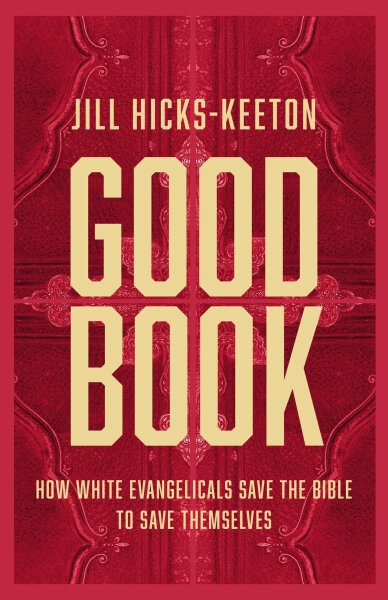A smart, fearless deconstruction of evangelical attempts to "save" the Bible, Good Book is compellingly written, persuasively argued, and brilliantly feminist. Jill Hicks-Keeton has written a necessary book for our moment.
Good Book interrogates how white evangelical Christians in the US make the Bible the "Good Book." An inanimate object with a contested table of contents ripe for multiple meanings and uses, the Bible cannot be a moral agent on its own. People must make it so, as indeed they have. As prevailing social norms change, evangelical Christians confront intellectual and interpretive challenges as they quest to make an ancient book newly relevant and ever benevolent, especially for historically oppressed populations. While histories show us that white Christians in the US have frequently appealed to their Bibles in support of issues now judged to be on the wrong side of history, including racism, sexism, and colonialism, contemporary white evangelical figures have in recent years worked steadfastly to defend the Bible against charges of complicity in harm. This is especially the case when it comes to patriarchy and the place of women, as evangelicals conscript the Bible into arguments for and against patriarchal normativity in response to changing conceptions of what is good.
The Bible's historical origins in the hierarchical, patriarchal contexts of the ancient world create challenges for any Christian seeking to interpret their Bible as fundamentally liberative. Good Book shows the creative negotiations that Bible-benevolence projects demand, as evangelicals wrestle both Jesus and Paul into advocates for women. The quest to maintain the Bible's goodness is ultimately a respectability project for evangelical Christians in the US who seek to maintain moral authority in an increasingly diverse religious landscape. Whether they rebrand patriarchy or seek to untangle the Bible from sexism, white evangelical Bible-benevolence projects perpetuate misogyny.
- Publisher Fortress Press
- Format Hardcover
- ISBN 9781506485850
- eBook ISBN 9781506485874
- Dimensions 5.75 x 8.75
- Pages 239
- Publication Date October 3, 2023
Endorsements
Rhiannon Graybill, Rhodes College
Good Book is essential reading for anyone who struggles with the logic of evangelical biblical interpretation and can't quite put their finger on why. Hicks-Keeton lays bare the rhetoric of self-salvation that threads through New Testament interpretation in evangelical circles to reveal the sheer political power that generates enormous economic benefit for purveyors and sows social discord in faith communities. Good Book is a timely intervention when people need spiritual connection and meaning-making--but for whom "the Bible-benevolence script" offers neither.
Katherine A. Shaner, Wake Forest University School of Divinity
Evangelicals have long engaged in the ruse of selective literalism, but Jill Hicks-Keeton's remarkable book demonstrates the many ways "Bible redeemers" have twisted the Scriptures to their own purposes. "It takes a lot of work to make Jesus good for women," the author argues, and Paul is even more of a challenge. The author's obvious command of the Bible makes her arguments difficult to refute. This is a wise and provocative--not to mention controversial--book, one that every Christian should take seriously.
Randall Balmer, author of Saving Faith: How American Christianity Can Reclaim Its Prophetic Voice
The Bible looms large in our society and casts a long shadow. Hicks-Keeton sheds light on shadow by examining how the insistence that the Bible is good serves other agendas that perpetuate harm. This book is for anyone who wants to wrestle with the Bible's complex legacy and continued influence in our lives.
Blake Chastain, host of Exvangelical and author of The Post-Evangelical Post (Substack)
Hicks-Keeton's Good Book is a magnificent critique of the toxicity of White evangelical apologetics--"Bible benevolence." Hicks-Keeton deftly analyses some of the most quoted, and most contentious, biblical passages as they are used by those who would contort them into something they're not: in this case, good for women. The book exposes just how intertwined--and dangerous--the policing of gender performance and attempts to save the Bible really are. It is a must-read for anyone who wants to add to their feminist research and teaching arsenal.
Meredith J. C. Warren, University of Sheffield
